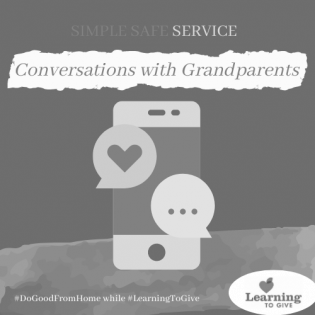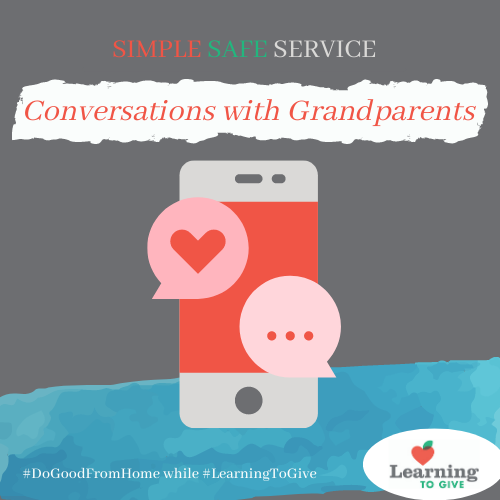Conversations with Grandparents
Keywords:
Art
Community
Empathy
Family
Intergenerational
Interview
Relationship Skills
Self-Awareness
SimpleSafeService
A Simple Safe Service project from home: Interview a grandparent or elderly friend to find out what they did for fun when they were young, and how it is the same and different than you. Follow your phone or video interview with a card in the mail. Or make friendly door hangers to donate to a local home for senior residents.
SIMPLE SAFE SERVICE
Simple Safe Service activities are designed to spark generous action and conversations promoting the good of all.
Many elderly people are isolated and cannot see their loved ones. This project includes making a welcome connection and following up with a card in the mail to show listening and caring reflection on what you discussed.
- Interview a grandparent or senior friend by phone via call or video chat and ask, “What did you do for fun when you were young?
- Use this conversation starter to compare activities from today and long ago.
- Draw pictures of you and a senior friend having fun together. Make it into a greeting card and write a nice note inside.
- Send cards or door hangers to residents at a senior living home to brighten someone’s day.
- Learn more with a Learning to Give lesson Living History – An Intergenerational Philanthropy project
Reflection: Look at pictures of your family and listen to stories from long ago. Reflect on how the stories make you feel about the people you care about and how they are the same or different than you.
Check out this sample video made by LTG Ambassador Lisa and granddaughters Maggie and Annie.
Find more Simple Safe Service activities:
Learning to Give ...
- educates youth about philanthropy, the civil society sector, and the importance of giving their time, talent and treasure for the common good (knowledge),
- equips youth by encouraging philanthropic behavior and experience (skills), and,
- empowers youth to take voluntary citizen action for the common good in their classrooms, lives and communities (behavior).

